
A YOUNG Chinese student who is now studying at New York University in the United States won the Documentary Bronze Medal at the 2014 Student Academy Awards in Hollywood on June 7 for his 40-minute documentary, “One Child.”
The documentary tells the stories of three families who lost their children during the Sichuan earthquake in 2008. Beichuan, where the stories took place, was one of the worst hit counties by the earthquake. More than 80 percent of the county was destroyed.
“I wanted to do something to help the earthquake victims, but there wasn’t much I could do, so I decided to make a documentary about the aftermath,” said Mu Zijian, who was born and grew up in the county.
Mu, 25, made the documentary as a student of New York University’s journalism graduate program. He pitched his documentary idea to NYU. The school liked it and offered him a scholarship.
A documentary from
experience
When the earthquake took place, Mu was a freshman at Sichuan University in Chengdu. The earthquake took the lives of many of his relatives, including his grandfather and several cousins. In 2012, he returned to Beichuan from New York to record the lives of the families who lost their only children in the earthquake.
“One Child” documents the reality of parents who pour everything into their one child, only to have their lives change drastically after a tragedy, Mu said.
As a Beichuan native, Mu has a very comprehensive understanding of what it is like to lose the only child in the family.
“No matter how much the government tries to reimburse or tries to donate to them, there’s nothing that can be done. They have the money, but they don’t have their child,” he said. “What I observed is how important these children are. The child is the core of the family,” he said.
“In today’s Beichuan, there are many very different situations. The families that had the chance to have a second child are very happy and spoil their children very much, while those that could not have another baby are in a very bad situation. Some don’t even go out to see people,” he said.
Eventually, Mu chose three families for the documentary.
The Jiangs lost their son, who was a Junior 2 student in middle school, and had a daughter after the earthquake. Although the family only had a small income, they pour all their love into taking care of and supporting their daughter.
The Fang family was too old to have another child. The wife wanted to adopt one, but her husband thought he was too old to raise another child, so the couple’s relationship fell apart.
A woman from the Gu family lost almost all of her close relatives, including her husband and daughter. She now turns to Buddhism for comfort and is trying to become a nun.
A hard process
After deciding the theme of the documentary, Mu first thought about recording the story of his own family, but it was “too difficult.”
He eventually decided to shoot the three other families, all of whom he has known for a long time.
“This was one of the reasons why I thought I should shoot a documentary about this theme,” he said. “Only those who have known these people for a long time and had experienced the tragedy can share their feelings and get them to trust you.”
However, the shooting was still a hard process.
In the first month, he did not shoot anything, but lived together with the families. “Every family has their own habits and their own ways of expressing feelings. The first month was me trying to adapt to their lives. They also needed to adapt to me holding a camera in front of them,” he said.
“I spent the whole time together with them, family by family. I was a fly on the wall. I wasn’t doing interviews, I wasn’t really producing footage based on a script or anything like that,” he said. “I was basically there and spent a lot of time trying to let them open up. Even though they knew me — everybody knows everybody in that small town — it still took them a long time to understand what I was trying to do and to get used to my presence with a camera all the time.”
It was a hard process for Mu, too. Since he too had lost many family members in the earthquake, the families’ tragedies could easily remind him of the pains of his own.
Moreover, he had to deal with all the pressure of making the documentary.
Due to a lack of financial support, he had to take over all the work. “Normally, it takes about four or five people to finish a documentary, but I did all the work alone and I had no one to share the stress with,” he said. “It was an experience that I will never forget.”
“One Child” was Mu’s project for graduation, and it will broadcast on PBS later this year.
In the meantime, Mu is also negotiating with several Chinese broadcasters, hoping that it will air in China.
(Wang Yuanyuan)
|

